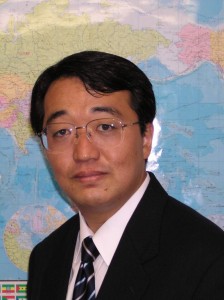緊張と統合:内村鑑三におけるキリスト教と日本の精神
このシリーズでは、私が1994年に執筆した統一神学大学院(Unification Theological Seminary)の神学課程修士論文(Divinity Thesis)を日英二か国語で掲載している。
4.日本文化とキリスト教の統合の続き
内村がそこから大胆に借用した『地球と人間』というギョーの有名な著書は、その人類文化の歴史をアメリカで終えているが、内村は神の摂理の下にある日本の使命を述べるために歴史をさらに一歩進めたのである。かれは日本の使命を、東洋の代弁者となり、西洋の先ぶれとなって、東洋と西洋を和解させ、世界文明の大きな二つの流れを統合することにあると見た。内村の論ずるところによれば、文明はアジアにおいて始まり、東と西の両方に向かって流れて行った。西に向かった流れはバビロン、フェニキア、ギリシア、ローマ、ドイツ、イギリスと進み、アメリカの太平洋側で最高点に達し、そして今日本に到達した。西洋の世界文明に果たした主要な貢献は、自由と自立の精神である。文明の第二の大きな流れは、インド、チベット、中国を通って、北京の満州宮廷に達した。この東洋文明の流れは、西洋において著しく欠けている相互依存と調和を特徴としている。内村によれば、地理的に見て:
日本国はその一方の腕をアメリカに向かって延ばし、今やヨーロッパ文明の最善の実を享受している。・・・そしてもう一方においては、・・・日本国はもう一つの腕を朝鮮国と支那国のこれに答へんとする腕に向かって延ばしており、全てが日本国をあたかも西欧と東洋の諸国の間の踏み石のようにしている・・・日本国はそこに民主主義の西洋と帝制の東洋の間の仲裁者、そしてまたキリスト教のアメリカと仏教のアジアの間の仲裁者、あるいは『仲人』として立っているのである。(原英文、魚谷訳)
無教会のキリスト教徒達は、キリスト教を新しい文化の中に移植するのに必要な唯一の土着化の要素は、神のインスピレーションと人間の霊であって、神と人間との間の自由な関係を妨げるような他のどんな要素も必要としないと感じている。日本的キリスト教とは、「全能者の気息によって触れ」た「日本魂」なのである。日本人がキリスト者になっても日本人であることをやめない。逆に、彼は新しいキリスト教徒としての価値をつけ加えることによって、彼の人格の中で土着の文化が拡大され、変容させられるために、より一層日本人となるのである。そしてまたキリスト教そのものも、侍の精神を付加されることによってより豊かになるのである。
キリスト教の土着化に対して、このような積極的な見解が与えられれば、教会が日本人に西洋の教派主義の詳細な点に至るまで従うように強制するような、堕落した土着化の形式に対して無教会が反対するのは別に驚くには当たらない。このようにして作られるのは、もうひとつのイギリス人やアメリカ人、あるいは「無定形の普遍的人間」でしかない。こうした場合、この日本人は本当の日本人でもなければ本当のクリスチャンでもないと内村は言う。むしろ、彼は「国籍を無くした日本人」の中の一人であり、「彼らの普遍性は、彼らの失った国籍を包み隠すために採用したアメリカニズムあるいはアングリカニズム以上のものではない。」この土着化の形式は、日本の文化とキリスト教の双方を歪める、悲惨な過程なのである。
IV. Synthesis of Japanese Culture and Christianity(Cont.)
While Guyot’s famous work The Earth and Man, from which Uchimura borrowed so liberally, ended its history of human progress with America, Uchimura took the history one step further in order to outline Japan’s mission under the providence of God. He saw this mission as one of unifying the two great streams of world civilization, of reconciling the East and West, of being the advocate of the East and the forerunner of the West.(4) Uchimura argues that civilization began in Asia and moved both to the East and the West; the stream flowing to the West marched through Babylon, Phoenicia, Greece, Rome, Germany, England, and culminated on the Pacific side of America, and now reached Japan. The major contribution of the West to the civilization of the world is the spirit of self-reliance and freedom. The second great stream of civilization passed through India, Tibet, China, and finally the Manchu Court of Peking. This line of Oriental civilization is characterized by a mutual dependence and harmony notably lacking in western culture.(5) According to Uchimura, geographically:
Japan stretches one arm toward America, now enjoying the choicest fruits of european civilization…. On the other hand, …she stretches the other arm towards the responding arms of Korea and China, the whole making Japan a steppingstone, as it were, between the occidental and the Oriental countries…. There she stands as an arbiter, a “middle man” (nakodo) between the Democratic West and the Imperial East, between the Christian America and the Buddhist Asia.(6)
The Mukyokai Christians feels that the only indigenizing elements necessary for the transplantation of Christianity into a new culture are God’s inspiration and man’s spirit; any other elements only hamper the free relationship between God and Man. Japanese Christianity is “the spirit of Japan inspired by God.” (7) A Japanese who became a Christian does not cease to be Japanese; on the contrary, he becomes more Japanese because his native culture is expanded and transformed within his personality through the addition of new Christian values. And Christianity itself is enriched by the addition of the samurai spirit.
Given this positive definition of Christian indigenization, it is not surprising that the Mukyokai reject the corrupt process of indigenization wherein the churches forces a man to conform to the minutiae of western denominationalism, thereby creating yet another Englishman, American, or “amorphous universal man.” In such cases, Uchimura noted, a Japanese Christian is neither a true Japanese nor a true Christian. Rather, he is one of group of “denationalized Japanese whose universality is no more than Americanism or Anglicanism, adopted to cover up their lost nationality.” This form of indigenization is a pitiful process, a double distortion both of Christianity and Japanese culture.
(4)Ibid., p.23f.
(5)Shin Ohara, Hyoden: Uchimura Kanzo [A Critical Biography of Kanzo Uchimura],.(Tokyo: Chuou Kouron Sha, 1976), p.179-215.
(6)Uchimura, Zenshu, XVI, p.20f. ed. Suzuki Toshihiro, Tokyo: Iwanami Shoten, 1932, vol. I, pp.545-552.
(7)Ibid., XV, p.452.
